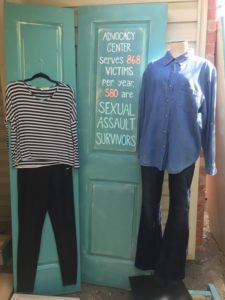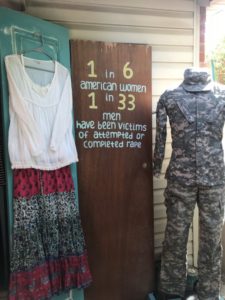2018 Greatest Hits #5: “What Were You Wearing, Waco?”
(During these last few weeks of December we will be reprising the Top 10 Most Opened Blog Posts for 2018 from the Act Locally Waco blog. I couldn’t possibly pick my favorites – so I used the simple (cop out?) approach of pulling up the 10 blog posts that got the most “opens” according to our Google Analytics. It is an intriguing collection that gives at least a little insight into the interests and concerns of Act Locally Waco readers. I hope this “Top 10” idea inspires you to go back and re-read your personal favorites. There have been so many terrific ones… If you would like to see the Top 10 according to Google Analytics, here’s the link: Top 10 Most Opened Blog Posts of 2018. Merry Christmas! — ABT)
by Berkeley Anderson and Geneece Goertzen
When someone gets mugged, we don’t say, “That suit you were wearing was a bad idea. It just screams ‘I’ve got money, rob me.’ We don’t ask victims, ‘What did you expect to happen when you had a wallet full of money? You were just asking to be robbed.’”
 So why do Sexual Assault victims face a barrage of questions that imply they are to blame for their own attack? “Were you drinking? Why did you go out alone? Why did you let your attacker into your room?”
So why do Sexual Assault victims face a barrage of questions that imply they are to blame for their own attack? “Were you drinking? Why did you go out alone? Why did you let your attacker into your room?”
And, of course, “Well, what were you wearing?”
The impact of these questions is difficult to quantify, but it shows up in survivors blaming themselves for their own assault. It shows up in rapists getting away with what should be easily prosecuted cases. It shows up in negative mental health outcomes for victims. It shows up in victims fearing to report the assault to police.
When assessing sexual violence, the only question that matters is consent. But rape culture–the normalization of sexual violence– causes some people to assert that clothing matters, shifting the focus off the obvious reason for the assault: that the attacker was a rapist.
April is recognized as National Sexual Assault Awareness Month which raises awareness about sexual violence, educates communities and individuals on how to prevent it, supports and empowers survivors, and strengthens the culture of consent.
According to the National Sexual Violence Resource Center, consent is an enthusiastic, ongoing, clearly communicated affirmative agreement to engage in various sexual or non-sexual activities. Past consent does not equal current consent. The absence of a “no” does not equal a “yes.” A person who is impaired cannot give consent. A child cannot consent. When sex is consensual, it means that the involved parties have granted permission. Non-consensual sex is rape.
 Sexual Assault affects people across all demographics. Although rape and sexual assault are often thought of as being committed by strangers in a dark alley, that is seldom the case. Most victims of sexual assault know their attacker. This is especially true for children. Neither is rape limited to young adult females. Women, men, and children of both genders experience rape and sexual assault. It happens in heterosexual relationships, and it happens among the LGBTQ community. It happens to the young and the old. It happens to the rich and poor. It happens within all religions and ethnic origins. It happens to singles, and it even happens within marriage. Every 98 seconds, an American is sexually assaulted.
Sexual Assault affects people across all demographics. Although rape and sexual assault are often thought of as being committed by strangers in a dark alley, that is seldom the case. Most victims of sexual assault know their attacker. This is especially true for children. Neither is rape limited to young adult females. Women, men, and children of both genders experience rape and sexual assault. It happens in heterosexual relationships, and it happens among the LGBTQ community. It happens to the young and the old. It happens to the rich and poor. It happens within all religions and ethnic origins. It happens to singles, and it even happens within marriage. Every 98 seconds, an American is sexually assaulted.
A powerful art exhibit, “What were you wearing Waco” on display through April, aims to debunk the myth that clothing caused the assault, by featuring representations of what victims were wearing at the time of their attack. The exhibit seeks to open doors in an attempt to combat victim-blaming, promote awareness, and destroy stereotypes about rape and sexual assault.
“What Were You Wearing, Waco?“ kicks off with an opening night event in conjunction with First Friday Waco at The Warehouse, 727 Austin Avenue. It will then move to different locations in Waco.
- Opening Night, April 6th at 6pm
- Austin’s on the Ave, April 5-14th, 3pm to 12am
- Outside Baylor Sub, April 16-26th, from 8am to 5pm
- At local churches & organizations throughout the month of April
- Closing Night, April 27 at 5pm at Jesus Said Love
There is also a traveling portion of the exhibit. If you would like a piece of the exhibit to advertise “What Were You Wearing” at your church, school, or business, please email [email protected].
The original “What Were You Wearing” project was created in 2013 by Jen Brockman, director of KU’s Sexual Assault Prevention and Education Center, and Dr. Mary A. Wyandt-Heibert, who oversees the University of Arkansas’ rape education center. Born out of an advocacy ideal, the installation asks participants to understand that it is never about the clothing, and ending sexual violence is not as easy as changing our clothes.
List of Resources:
If you or someone you know has been Sexually Assaulted, you can call the Advocacy Center for Crime Victims and Children at (254) 752-9330. Their crisis hotline is available 24/7 at (888) 867-7233.
If you or someone you know is a victim of Domestic Violence, you can call the Family Abuse Center at (254) 772-8999. Or you can contact the 24-hour hotline at (800) 283-8401.
Baylor’s Title IX department: 254-710-8454 or visit, https://www.baylor.edu/titleIX/
 Geneece Goertzen is on the Board of Directors for the Family Abuse Center, and has a passion for victim advocacy. She has worked as costume designer for many of the recent shows at Waco Civic Theatre, as well as having created many historical costumes over the last decade.
Geneece Goertzen is on the Board of Directors for the Family Abuse Center, and has a passion for victim advocacy. She has worked as costume designer for many of the recent shows at Waco Civic Theatre, as well as having created many historical costumes over the last decade.
 Berkeley Anderson has a Master’s degree in public service and degrees in physics and history. She loves slam poetry, hot sauce, and any dog she meets. She is the Teen Dating Violence Project Manager at the Family Abuse Center.
Berkeley Anderson has a Master’s degree in public service and degrees in physics and history. She loves slam poetry, hot sauce, and any dog she meets. She is the Teen Dating Violence Project Manager at the Family Abuse Center.
The Act Locally Waco blog publishes posts with a connection to these aspirations for Waco. If you are interested in writing for the Act Locally Waco Blog, please email [email protected] for more information.
